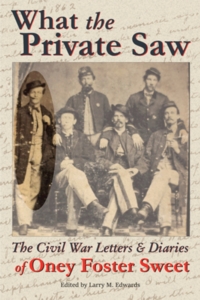Excerpt . . .
Introduction

This material was written by our Grandfather, Oney Foster Sweet, during his service as a volunteer in the Union Army during the American Civil War. He enlisted on September 4, 1861, when he was nineteen (born December 13, 1841) [and mustered out on June 10, 1865]. The earliest diary is for 1863. We do not know whether he kept one for 1861 or 1862, but his letters were more frequent and informative in this period.
The three diaries are small. Each different but all leather bound and from two and one-half inches wide to three or four inches high, with a page for each day. Most entries are in ink and in many instances faded, so some words are illegible (when a key word did not come up with a magnifying glass, a guess or blank was used).
Many abbreviations appear throughout and have been as written where possible. However, some military terms, such as the abbreviation for regiment, is quite stylized and not suitable for duplication on a printer. Also there are some interesting spellings and a bit of transition or evaluation from start to finish. For example, “crosst” appears in the diary for over a year before coming out “crossed.” “Sara” and “Sarah” are both used in reference to his sister. The objective has been to reproduce what he wrote as he wrote it.
Nearly every diary entry begins with an observation of the prevailing weather conditions. That was very important, since heat and cold, rain, snow, and humidity dictated the way each day might turn out. The conditions in the field, where most of the entries were written, are difficult to imagine today.
The feeding of thousands of men in the 1860s was, at best, primitive. On some occasions regular hot meals were dished out from a cook tent. But much of the time field rations requiring preparation were issued in bulk for several days’ meals. This encouraged soldiers to forage for what they could find to supplement their provisions. It also brought small groups together to prepare their food over open fires.
Even water supplies were limited, so the streams and rivers were used for drinking as well as bathing and washing clothes. Often toilet facilities consisted of a designated area behind a tree! During cold or wet weather the men would make a shelter of stacked logs for walls with lighter limbs supporting tent parts overhead. Two to four men would share these huts when they were not moving camp for a few days. On a march they slept where they stopped, off the line of march, by a tree or shrub out of the mud.
On marches, each man carried his knapsack containing extra clothing, such as a coat, underwear, socks, food and personal gear; i.e, a diary, plus his weapon and ammunition. While a march might cover only five or six miles, some were thirty or more. The roads or trails were unpaved and in wet weather the mud was deep and sometimes very cold.
Yet, with all these hardships, Oney Foster Sweet seems to have greeted most days with a remarkable zeal. He was smaller than most men, weighing about 130 pounds and standing five foot three. He had spunk, a good attitude, was loyal and he was a survivor. That is why we are here!
Credit should be given to Ruth Sweet Carmichael for copying the letters. To Mildred Sweet Johnston Ketchum and Phyllis Atkinson Mieldazies for locating and sending along the appendix material. To Welesley “Duke” “Tommy” Atkinson for preserving the diaries and trusting them to me. And to my sister, Mary Virginia Sweet Wagner, for transcribing the tapes from my puzzling, sporadic dictation as I tried to decipher the faded entries.
Now to the letters and diaries. They often seem as interesting for what is not said as for what is said.
George Olney Sweet (1912-2010)
Grandson of Oney F. Sweet
More excerpts . . .
What the Private Saw: The Civil War Letters and Diaries of Oney Foster Sweet will be released on April 9, 2015, the 150th anniversary of Confederate General Robert E. Lee’s surrender at Appomattox Court House, effectively ending the U.S. Civil War.

To get on the mailing list or for for additional information, contact:
Wigeon Publishing
info@wigeonpublishing.com
|

